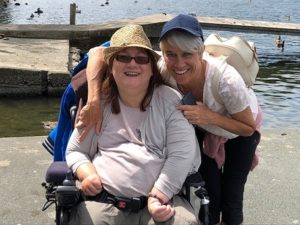
Quality care should always based completely around your personal needs and daily routines, which means there is no typical day of live-in care. However, so you have an idea of what it’s like to have a live-in carer, we’ve put together this example to give you a taste.
Starting the day your way
Live-in care enables you to maintain all the routines that you’re used to. If you like to wake up at a certain time or have a particular way that you like your morning coffee prepared, live-in support enables you to begin the day in the right way.
The support provided through live-in care also extends to getting dressed and support with morning hygiene such as brushing teeth or helping you into the shower. There are bound to be areas that you will want to do yourself or that you don’t feel comfortable having someone around to help with – it’s completely natural and you don’t need to worry; with live-in care, your personal space and privacy is always respected.
The things that matter most

There are a number of ways live-in care can make this happen, whether you just need someone to accompany you to see your friends on the bus or someone to drive you themselves. And just like with your morning ritual, privacy and personal space is always respected.
With live-in care, you can enjoy days out with your friends. Unlike with care homes, you can still invite friends and family over to your home whenever you’d like them to, allowing you to retain those all-important connections.
Care doesn’t have a 9 to 5 schedule
We all love to do something to unwind in the evening, like having a hot chocolate or enjoying our favourite TV shows, and this should never change. Having live-in care support means that you can keep your nightly routine and choose when you’re ready for bed. You can also share an evening meal with a carer and have a good chat about the day before having assistance with bathing, changing clothing and taking any medication with the help of a night care assistant.
Because live-in care support is 24 hours, assistance is available at any time during the night. This can include helping you go to the bathroom but also ensures that you’re safe should you have to get up in the night for any reason.
Specialist support for advanced care needs and dementia

A focus on comfort and the familiarity of a routine is especially important for individuals with dementia. By working with you to understand what you need, our expert dementia care team will follow a specifically tailored care plan for your loved one to ease moments of confusion and maximise independence.
Independence and comfort are also key in live-in care support for people recovering from a brain or spinal injury. These are traumatic experiences and can lead to all kinds of questions about how the injury will impact you or a loved one’s daily life. With carers trained in carrying out personal care and assisting with moving and handling procedures, an independent lifestyle is still possible with live-in care.
A typical day of live-in care can be hard to describe because no two days are rarely the same. But what is always true is that this kind of support offers choice and will enable you to follow the routine you feel most comfortable with, and without having to leave you home.
